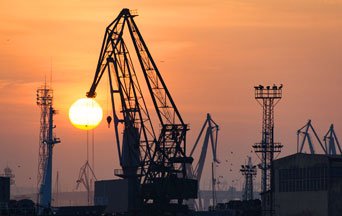
As Fred Schwarz, author of You Can Trust the Communists (to Be Communists), affirmed, communists can be trusted to be communists, inveterate liars and deceivers, but not to be trusted otherwise. This begs the question as to why anyone would buy any security-sensitive equipment from Chinese communists.
The recent arrival of ship-to-shore cranes at the Port of Virginia’s Norfolk International Terminals manufactured by Shanghai Zhenhua Heavy Industries Company Limited (ZPMC), a state-owned engineering company, has sparked security concerns among U.S. defense officials.
The most recent findings confirm that some Chinese-made cranes used at U.S. ports have communications equipment with no apparent purpose or record of their installation.
The investigation by the House Committee on Homeland Security and House Select Committee on China focused on some 200 Chinese-made cranes installed at U.S. American ports and other facilities.
House lawmakers reported that cellular modems on the cranes can be used for remote communication. These modems were not documented in any contract.
U.S. defense and national security officials fear China will exploit its crane technology to gather intelligence on shipments supporting U.S. military operations. The cranes are equipped with sensors capable of tracking container origins and destinations, and there are also concerns that potential remote access vulnerabilities could disrupt shipping operations, as reported by Pentagon and national security officials.
Devices such as cameras and weight and safety sensors constitute vital technology integrated into equipment systems. The potential espionage dangers are alarming.
For instance, China could exploit a crane’s cameras to track a container by identifying its serial number and origin. Moreover, the ability to disrupt cargo operations by manipulating safety sensors or generating false readings poses significant risks.
Eternal and Natural Law: The Foundation of Morals and Law
Since 2000, the Port of Virginia has relied on ZPMC cranes except for its Newport News Marine Terminal, whose cranes are manufactured by a U.S. company.
ZPMC accounts for some 70 percent of the global market share for large-scale cranes handling port containers and bulk materials. Its cranes are present in 104 countries and comprise nearly 80 percent of those used at U.S. ports. The absence of comparable American-made cranes has been highlighted in recent discussions with alternatives from Finnish company Konecranes, which cost significantly more.
Amid escalating tensions between the United States and China, the Chinese Foreign Ministry has dismissed U.S. concerns as “complete paranoia,” a predictable response from an untrustworthy adversary.
A bipartisan group of twelve United States senators, including Sen. Mark Warner (D-VA), chairman of the Senate’s Select Committee on Intelligence, and Sen. John Thune (R-SD), have introduced a bill that empowers the Department of Commerce to review and prohibit transactions involving information and communication technology products with potential security risks.
The proposed Restricting the Emergence of Security Threats and Communications Technology (RESTRICT) Act could lead to banning platforms like TikTok. While not banned by the federal government, as of April 2023, thirty-four states have either announced or enacted bans on using TikTok by state government agencies, employees and contractors on government-issued devices.
During the Senate Intelligence Committee’s hearing on global threats, Sen. Warner stressed the critical need for U.S. investment in talent, tools and research to retain its lead in emerging technologies. Noting China’s increasing role in international technology standards-setting bodies and its integration into global supply chains, he urged the United States to bolster its technological capabilities.
 Learn All About the Prophecies of Our Lady of Good Success About Our Times
Learn All About the Prophecies of Our Lady of Good Success About Our Times
The technological race between the United States and China has extended to artificial intelligence (A.I.). In March 2021, President Biden signed an executive order to boost U.S. competitiveness in A.I., stating that bold investments in American innovation will ensure our economic strength and national security for decades to come.
Even a fundamental understanding of communist philosophy and practice makes it clear that communists cannot be trusted in the global technology domain, let alone to reshape the world order. The West must develop and secure a robust tech sector and ensure that Xi’s fevered vision of Chinese dominance does not come to pass.
Photo Credit: © thirdkey – stock.adobe.com

